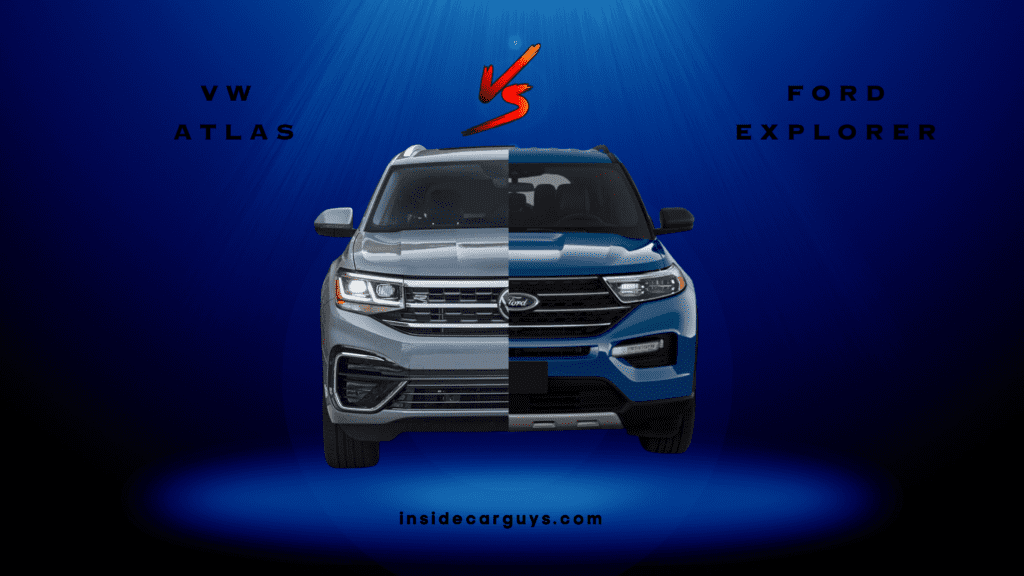When it comes to finding the perfect family SUV, the 2023 Volkswagen Atlas and Ford Explorer stand out as two top contenders in the market. Both vehicles boast a blend of practicality, style, and performance, making them ideal choices for families on the go.
In this comprehensive comparison, we will examine all aspects of these two SUVs, including exterior and interior design, seating, storage, performance, fuel efficiency, safety, trim levels, and pricing. Our goal is to provide you with a detailed analysis to help you determine which vehicle best suits your needs and preferences.
Exterior Design:
The 2023 VW Atlas and Ford Explorer both exhibit strong road presence, but their design philosophies are notably different.
The 2023 Volkswagen Atlas features a clean and bold design with a prominent front grille flanked by sleek LED headlights. The Atlas’s angular lines and high beltline give it a modern and somewhat imposing appearance. In contrast to the rounded corners of many competitors, the Atlas stands out with its boxy, rugged look.
The 2023 Ford Explorer takes a more streamlined approach, with flowing lines and a sculpted body that lends it an air of sophistication. The Explorer’s dynamic grille and slim LED headlights give it a distinctive front fascia, while the sloping roofline adds an athletic touch.
Interior Design:
The interiors of both the 2023 VW Atlas and Ford Explorer focus on comfort, functionality, and providing a sense of luxury.
Inside the Atlas, you’ll find a minimalist yet upscale design featuring high-quality materials and soft-touch surfaces. The infotainment system is user-friendly, with a modern touchscreen interface and intuitive controls. The cabin is also well-insulated, providing a quiet and comfortable ride.
The Explorer’s interior offers a more refined experience, with an emphasis on premium materials and a sleek, uncluttered layout. The dashboard is dominated by a large touchscreen that controls most of the vehicle’s functions, while physical buttons are used sparingly. Ambient lighting and available leather upholstery add to the Explorer’s luxurious feel.
Seating:
Both SUVs can accommodate up to seven passengers, but their approaches to seating differ slightly.
The Atlas boasts ample space in all three rows, even for taller passengers, with comfortable and supportive seats. The second-row bench can slide and recline, while the third row is more spacious than in many competitors.
The Explorer provides generous space for passengers in the first and second rows, with comfortable seats that offer a good amount of adjustability. However, the third row can be a bit tight for taller occupants, making it more suitable for children or shorter trips.
Storage:
When it comes to storage and cargo capacity, both vehicles offer practical solutions to accommodate family needs.
The Atlas provides a cavernous cargo area, with 20.6 cubic feet of space behind the third row, 55.5 cubic feet with the third row folded, and a maximum of 96.8 cubic feet with both rear rows folded. Additionally, there are numerous storage compartments throughout the cabin, including door pockets and a sizable glovebox.
The Explorer offers slightly less cargo space, with 18.2 cubic feet behind the third row, 47.9 cubic feet with the third row folded, and 87.8 cubic feet with both rear rows folded. It does, however, feature a convenient power liftgate and various storage compartments throughout the cabin.
Performance:
Both the 2023 VW Atlas and Ford Explorer offer engaging driving experiences and a variety of powertrain options.
The Atlas comes standard with a 2.0-liter turbocharged four-cylinder engine producing 235 horsepower, while an optional 3.6-liter V6 engine generates 276 horsepower. Both engines are paired with an eight-speed automatic transmission, delivering smooth and responsive shifts. The Atlas offers a comfortable ride, with well-controlled body motions and accurate steering, making it easy to maneuver in tight spaces.
The Explorer’s standard engine is a 2.3-liter turbocharged four-cylinder, producing 300 horsepower. Two additional engine options are available: a 3.0-liter twin-turbocharged V6 with 400 horsepower and a 3.3-liter V6 hybrid powertrain producing a combined 318 horsepower. All engines are paired with a 10-speed automatic transmission. The Explorer’s ride is more athletic, with a well-tuned suspension and precise steering, making it enjoyable to drive on twisty roads.
Fuel Efficiency:
Fuel economy is an important consideration for many buyers, and both SUVs offer competitive figures.
The Atlas’s base 2.0-liter engine is rated at 21 mpg city and 24 mpg highway, while the optional 3.6-liter V6 returns 17 mpg city and 23 mpg highway. Both engines are relatively efficient for the segment, especially considering the Atlas’s size.
The Explorer’s base 2.3-liter engine delivers 21 mpg city and 28 mpg highway, while the 3.0-liter twin-turbo V6 returns 18 mpg city and 26 mpg highway. The hybrid powertrain offers the best fuel economy, with 27 mpg city and 29 mpg highway. Overall, the Explorer offers a more fuel-efficient lineup, particularly with its hybrid option.
Safety:
Both the 2023 VW Atlas and Ford Explorer come equipped with a suite of advanced safety features, providing peace of mind for families.
The Atlas offers standard safety features like forward collision warning, automatic emergency braking, blind-spot monitoring, and rear cross-traffic alert. Optional features include adaptive cruise control, lane departure warning, and a surround-view camera system.
The Explorer includes the Ford Co-Pilot360 suite as standard, with features like forward collision warning, automatic emergency braking, pedestrian detection, blind-spot monitoring, and lane-keeping assist. Optional features include adaptive cruise control, evasive steering assist, and a 360-degree camera system.
Trim Levels:
Both SUVs come in a variety of trim levels, catering to different preferences and budgets.
The Atlas is available in eight trims: S, SE, SE with Technology, SE with Technology R-Line, SEL, SEL R-Line, SEL Premium, and SEL Premium R-Line. Each trim builds on the features of the previous one, with the R-Line trims adding sporty exterior touches.
The Explorer is offered in five trims: Base, XLT, Limited, ST, and Platinum. The Base and XLT trims focus on value and essential features, while the Limited trim adds luxury appointments. The ST trim targets performance enthusiasts, and the Platinum trim provides the most premium experience.
Pricing:
Pricing for both SUVs varies depending on trim levels and optional packages.
The 2023 VW Atlas has a starting price of around $33,000 for the base S trim, with prices reaching up to $50,000 for the fully loaded SEL Premium R-Line.
The 2023 Ford Explorer starts at approximately $33,500 for the base trim, with prices climbing to nearly $55,000 for the range-topping Platinum trim.
Key Differences:
To help you make an informed decision, this section aims to provide valuable insights to guide you towards the SUV that best aligns with your family’s needs and preferences.
Design Philosophy:
The VW Atlas exhibits a more boxy and rugged appearance, characterized by its angular lines and bold front grille. In contrast, the Ford Explorer presents a more sculpted and streamlined design, with flowing lines and a dynamic grille, giving it a sleek and sophisticated appearance.
Interior Space:
The VW Atlas offers more spacious seating across all three rows, making it a better option for families with taller passengers or those who prioritize cabin space. The Ford Explorer, on the other hand, provides ample space in the first two rows, but its third row is more suitable for children or shorter trips.
Cargo Capacity:
The VW Atlas boasts greater cargo capacity with 20.6/55.5/96.8 cubic feet of space, depending on how the rear seats are configured. The Ford Explorer offers slightly less storage, with 18.2/47.9/87.8 cubic feet of space in the same configurations.
Performance:
The Ford Explorer provides a more athletic driving experience, thanks to its well-tuned suspension and precise steering. The Explorer also offers a more powerful engine lineup, including a twin-turbo V6 and a hybrid option. The VW Atlas, while not as sporty, delivers a comfortable and composed ride with accurate steering.
Fuel Efficiency:
The Ford Explorer has a more fuel-efficient lineup, with its base 2.3-liter engine achieving 21 mpg city and 28 mpg highway, and its hybrid powertrain offering 27 mpg city and 29 mpg highway. The VW Atlas provides competitive fuel economy for its size, but its engines return slightly lower figures, with the base 2.0-liter engine rated at 21 mpg city and 24 mpg highway, and the 3.6-liter V6 achieving 17 mpg city and 23 mpg highway.
Trim Levels and Styling:
The VW Atlas is available in eight trims, including R-Line versions that add sporty exterior touches. The Ford Explorer comes in five trims, each catering to different preferences, from value-focused to performance-oriented and luxurious.
Pricing:
While both SUVs have similar starting prices, the range-topping Ford Explorer Platinum trim is more expensive than the fully loaded VW Atlas SEL Premium R-Line, with a difference of around $5,000.
Final Thoughts:
After a thorough comparison of the 2023 VW Atlas and Ford Explorer, it’s clear that both SUVs have a lot to offer for families seeking a stylish, practical, and comfortable vehicle. The Atlas stands out for its spacious interior, generous cargo capacity, and bold design, making it an ideal choice for families who prioritize space and a more rugged appearance.
On the other hand, the Explorer’s fuel-efficient engine lineup, athletic driving dynamics, and sleek design make it an attractive option for those seeking a more performance-oriented and sophisticated SUV. Ultimately, the decision comes down to personal preferences and priorities, but either vehicle would make an excellent choice for family adventures.
Features Breakdown
2023 VW Atlas Features Breakdown:
- Exterior Design:
- Bold and angular design
- Prominent front grille
- Sleek LED headlights
- Boxy, rugged appearance
- Interior Design:
- Minimalist, upscale cabin
- High-quality materials
- User-friendly infotainment system
- Well-insulated, quiet ride
- Seating:
- Seats up to seven passengers
- Ample space in all three rows
- Sliding and reclining second-row bench
- Storage:
- 20.6/55.5/96.8 cubic feet of cargo space
- Numerous storage compartments throughout the cabin
- Performance:
- 2.0-liter turbocharged four-cylinder (235 hp) or 3.6-liter V6 (276 hp)
- Eight-speed automatic transmission
- Comfortable ride with accurate steering
- Fuel Efficiency:
- 21 mpg city and 24 mpg highway (2.0-liter engine)
- 17 mpg city and 23 mpg highway (3.6-liter engine)
- Safety:
- Standard forward collision warning, automatic emergency braking, blind-spot monitoring, and rear cross-traffic alert
- Optional adaptive cruise control, lane departure warning, and surround-view camera system
- Trim Levels:
- S, SE, SE with Technology, SE with Technology R-Line, SEL, SEL R-Line, SEL Premium, and SEL Premium R-Line
- Pricing:
- Starting price: around $33,000 (base S trim)
- Top price: up to $50,000 (fully loaded SEL Premium R-Line)
2023 Ford Explorer Features Breakdown:
- Exterior Design:
- Streamlined, sculpted body
- Dynamic grille and slim LED headlights
- Sloping roofline for an athletic touch
- Interior Design:
- Refined, uncluttered layout
- Premium materials
- Large touchscreen infotainment system
- Ambient lighting and available leather upholstery
- Seating:
- Seats up to seven passengers
- Generous space in first and second rows
- Third row more suitable for children or shorter trips
- Storage:
- 18.2/47.9/87.8 cubic feet of cargo space
- Power liftgate and various storage compartments
- Performance:
- 2.3-liter turbocharged four-cylinder (300 hp), 3.0-liter twin-turbo V6 (400 hp), or 3.3-liter V6 hybrid (318 hp combined)
- 10-speed automatic transmission
- Athletic ride with well-tuned suspension and precise steering
- Fuel Efficiency:
- 21 mpg city and 28 mpg highway (2.3-liter engine)
- 18 mpg city and 26 mpg highway (3.0-liter twin-turbo V6)
- 27 mpg city and 29 mpg highway (hybrid powertrain)
- Safety:
- Standard Ford Co-Pilot360 suite, including forward collision warning, automatic emergency braking, pedestrian detection, blind-spot monitoring, and lane-keeping assist
- Optional adaptive cruise control, evasive steering assist, and 360-degree camera system
- Trim Levels:
- Base, XLT, Limited, ST, and Platinum
- Pricing:
- Starting price: around $33,500 (base trim)
- Top price: nearly $55,000 (range-topping Platinum trim)





